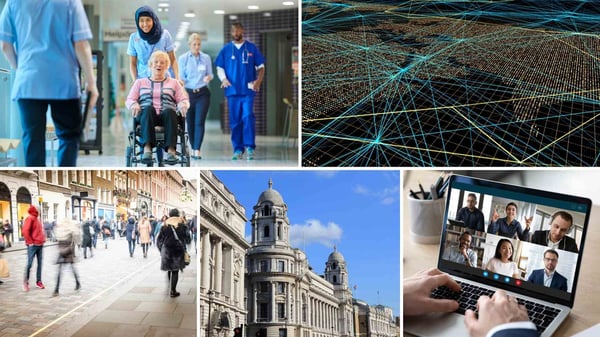Government Transformation Summit: Key takeaways
Last Thursday was a day packed with thought-provoking dialogues at the Government Transformation Summit. Public sector delegates from the UK and abroad joined us to discuss some of the most pressing issues within government delivery today - and they did so candidly and frankly.
 As Government Transformation Magazine’s GM for Government, I had the privilege to moderate the panels on the centre stage: conversations ranging from how Civil Service leaders can drive change in the digital era, to ways in which government can accelerate delivery for the benefit of citizens. The ideas and opinions expressed by our delegates were very diverse but there were some common trends among them. Below are my six takes:
As Government Transformation Magazine’s GM for Government, I had the privilege to moderate the panels on the centre stage: conversations ranging from how Civil Service leaders can drive change in the digital era, to ways in which government can accelerate delivery for the benefit of citizens. The ideas and opinions expressed by our delegates were very diverse but there were some common trends among them. Below are my six takes:
1. Why do we keep making it so hard in the UK?
Colleagues from countries as different as Estonia, Canada, Belgium or Sweden reminded us that it is unnecessary to make transformation as difficult and complicated as we do it in the UK. Although we do indeed have a complex government structure and intricate funding models, our international peers think that we still add extra complexity and difficulties to the mix. As Lord Francis Maude, along with some of the Canadian speakers candidly advised us: we need more collaboration and to just get things done as a matter of routine, and not just when there's an existential crisis (Covid).
2. Recruitment and retention continue to be extremely challenging
The skills shortage remains an important issue for government organisations who continue to battle for talent against the aggressive competition of corporate salaries - there is nothing new in that, we’ve been seeing this problem for years. The UK is not alone and as delegates from overseas shared with us, it is also a challenge for most administrations. The stark reality is that there are more jobs than people and amidst the cost-of-living crisis, the vocational drive to work in the Civil Service might no longer be the only consideration for candidates. Speakers agreed that there is a need for urgent reform in recruitment processes and salaries keeping up with inflation if government doesn’t want to see what is already a dire skills crisis become even worse.
3. It's not all is doom and gloom
There are many positive examples that show us that government also gets it right! Despite the ongoing challenges, we also heard from delegates and sponsors how there are also instances of government doing great things that work for citizens.
Our colleagues at Adobe shared how they have been working with the Australian and Canadian governments in recent years to transform dysfunctional and old-fashioned paper-based services into new ones fit for the 21st century.
At home, we heard from the likes of Mary Barber, Director of Transformation at HMRC, how there has been a notable shift from service-centred to user-centred design - a trend that is very much growing within government departments.
4. Cloud spotting
Cloud is already in government: it is mature and it is here to stay. Gone are the days when government organisations were still immersed in the on-premise vs cloud dilemma. There is an acknowledgement that cloud is an essential element for any transformation. This will be particularly critical for continuing enabling a remote or hybrid workforce.
5. Promoting trade and economic growth
The Summit saw important input from leaders from trade and economic development agencies, such as the Department for International Trade or the Intellectual Property Office. This highlighted the role that technology and transformation play within government to enable and support international trade, particularly post-Brexit. Getting it right will have greater implications than anticipated.
6. The missing one: sustainability
Although there was a discussion table focused on sustainability, the climate and wider sustainability themes were less prevalent during the stage conversations, including the keynotes from sponsors. However, we do know that there is a lot of work going on around this: from climate impact assessments to mandatory requirements in procurement contracts. 

By David Wilde
David Wilde, is the General Manager at Government Transformation magazine, and was previously held policy roles in Cabinet Office and was CIO of the Deputy PM's Office. He then went on to be Executive Director and CIO of Essex County Council, Westminster City Council and the London Borough of Waltham Forest. He has also been a Non Executive Director of Mid-Essex Healthcare Trust, and a Director of two large Multi-Academy Trusts.Also Read
- NAO chief urges Whitehall to pair AI with cost transparency to unlock government productivity
- Beyond the consultancy cycle: rethinking how the public sector builds capability
- Transforming public services: why people, partnerships, and tackling technical debt matter most
- ‘Roadmap for Modern Digital Government’ sets out tech-led transformation to 2030

-1.jpg?width=600&name=Untitled%20design%20(5)-1.jpg)


